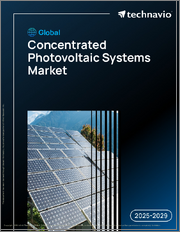
|
시장보고서
상품코드
1670428
태양광발전 시장 규모, 점유율, 성장 분석 : 컴포넌트별, 재료별, 셀 타입별, 설치 유형별, 용도별, 지역별 - 산업 예측(2025-2032년)Photovoltaic Market Size, Share, and Growth Analysis, By Component (Modules, Inverters), By Material (Silicon, Compounds), By Cell Type, By Installation Type, By Application, By Region - Industry Forecast 2025-2032 |
||||||
태양광발전 세계 시장 규모는 2023년 946억 달러, 2024년 1,038억 7,000만 달러에서 2032년에는 2,194억 4,000만 달러로 성장하고, 예측 기간(2025-2032년) 동안 9.8%의 연평균 복합 성장률(CAGR)을 보일 것으로 예상됩니다.
세계 태양광발전 시장은 재생 가능 에너지에 대한 수요 증가와 지속가능성에 대한 세계 관심에 힘입어 강력한 성장세를 보이고 있습니다. 태양광을 효율적으로 전력으로 변환하는 이 기술은 기후 변화를 완화하고 화석연료에 대한 의존도를 줄이는 데 매우 중요한 역할을 하고 있습니다. 태양광발전 기술의 발전으로 비용이 절감되고 주거용 및 상업용 시스템의 가격이 저렴해짐에 따라, 특히 태양광 투자를 촉진하는 정부의 인센티브 정책으로 인해 보급률이 급증하고 있습니다. 또한 인구 증가로 인한 에너지 수요 증가와 이산화탄소 배출량 감축이 시급한 상황도 시장 성장을 더욱 가속화하고 있습니다. 페로브스카이트 태양전지와 같은 새로운 기술 혁신은 효율을 크게 향상시켜 청정 에너지원으로의 전환에 있어 태양에너지의 중요한 위치를 강화하고 있습니다.
목차
서론
- 조사 목적
- 조사 범위
- 정의
조사 방법
- 정보 조달
- 2차와 1차 데이터 방법
- 시장 규모 예측
- 시장 전제조건과 제한
주요 요약
- 세계 시장 전망
- 공급과 수요 동향 분석
- 부문별 기회 분석
시장 역학과 전망
- 시장 개요
- 시장 규모
- 시장 역학
- 성장 촉진요인과 기회
- 성장 억제요인과 과제
- Porter의 Five Forces 분석
주요 시장 인사이트
- 중요 성공 요인
- 경쟁 정도
- 주요 투자 기회
- 시장 생태계
- 시장의 매력 지수(2024년)
- PESTEL 분석
- 거시경제 지표
- 밸류체인 분석
- 가격 분석
- 규제 상황
- 사례 연구
- 기술 진보
태양광발전 시장 규모 : 컴포넌트별&CAGR(2025-2032)
- 시장 개요
- 모듈
- 인버터
- 시스템 밸런스(BOS)
- 연결 및 케이블
- 정션 박스
- 안전 장비
- 트래커
- 배터리
- 모니터링 시스템
- 기타
태양광발전 시장 규모 : 재료별&CAGR(2025-2032)
- 시장 개요
- 실리콘
- 결정 실리콘(C-Si)
- 박막
- 화합물
- Copper Indium Gallium Selenide (CIGS)
- Cadmium Telluride (CDTE)
태양광발전 시장 규모 : 셀 타입별&CAGR(2025-2032)
- 시장 개요
- Full-Cell PV Modules
- Half-Cell PV Modules
태양광발전 시장 규모 : 설치 유형별&CAGR(2025-2032)
- 시장 개요
- 지상 설치형
- 건물 일체형 태양광발전(BIPV)
- 옥상
- 창문
- 수상 태양광발전
태양광발전 시장 규모 : 용도별&CAGR(2025-2032)
- 시장 개요
- 주택
- 상업 및 산업
- 유틸리티
태양광발전 시장 규모 : 지역별&CAGR(2025-2032)
- 북미
- 미국
- 캐나다
- 유럽
- 독일
- 스페인
- 프랑스
- 영국
- 이탈리아
- 기타 유럽
- 아시아태평양
- 중국
- 인도
- 일본
- 한국
- 기타 아시아태평양
- 라틴아메리카
- 브라질
- 기타 라틴아메리카
- 중동 및 아프리카
- GCC 국가
- 남아프리카공화국
- 기타 중동 및 아프리카
경쟁 정보
- 주요 5개사 비교
- 주요 기업의 시장 포지셔닝(2024년)
- 주요 시장 기업이 채택한 전략
- 최근 시장 동향
- 기업의 시장 점유율 분석(2024년)
- 주요 기업 개요
- 기업 상세
- 제품 포트폴리오 분석
- 기업 부문별 점유율 분석
- 전년대비 매출 비교(2022-2024년)
주요 기업 개요
- JinkoSolar(China)
- LONGi Green Energy Technology(China)
- Canadian Solar(Canada)
- Trina Solar(China)
- First Solar(United States)
- JA Solar(China)
- Hanwha Q CELLS(South Korea)
- Risen Energy(China)
- SunPower Corporation(United States)
- GCL-Poly Energy Holdings Limited(China)
- Talesun Solar(China)
- Suntech Power(China)
- Yingli Solar(China)
- REC Group(Norway)
- Seraphim Solar(China)
- Chint Solar(Astronergy)(China)
- Sharp Corporation(Japan)
- Panasonic Corporation(Japan)
- LG Electronics(South Korea)
- Meyer Burger Technology AG(Switzerland)
결론과 제안
LSH 25.04.10Global Photovoltaic Market size was valued at USD 94.6 billion in 2023 and is poised to grow from USD 103.87 billion in 2024 to USD 219.44 billion by 2032, growing at a CAGR of 9.8% during the forecast period (2025-2032).
The global photovoltaic market is poised for robust growth, spurred by the escalating demand for renewable energy and a worldwide pivot toward sustainability. This technology, which efficiently converts sunlight into electricity, plays a pivotal role in mitigating climate change and reducing reliance on fossil fuels. With advancements in solar technology reducing costs and making photovoltaic systems more affordable for residential and commercial use, adoption rates are skyrocketing, especially with government incentives promoting solar investments. Additionally, the increasing energy demand from a growing population and the urgent need to lower carbon footprints further accelerate market growth. Emerging innovations, such as perovskite solar cells, promise significant advancements in efficiency, reinforcing solar energy's critical position in the transition to cleaner energy sources.
Top-down and bottom-up approaches were used to estimate and validate the size of the Global Photovoltaic market and to estimate the size of various other dependent submarkets. The research methodology used to estimate the market size includes the following details: The key players in the market were identified through secondary research, and their market shares in the respective regions were determined through primary and secondary research. This entire procedure includes the study of the annual and financial reports of the top market players and extensive interviews for key insights from industry leaders such as CEOs, VPs, directors, and marketing executives. All percentage shares split, and breakdowns were determined using secondary sources and verified through Primary sources. All possible parameters that affect the markets covered in this research study have been accounted for, viewed in extensive detail, verified through primary research, and analyzed to get the final quantitative and qualitative data.
Global Photovoltaic Market Segments Analysis
Global Photovoltaic Market is segmented by Component, Material, Cell Type, Installation Type, Application and region. Based on Component, the market is segmented into Modules, Inverters and Balance of System (BOS). Based on Material, the market is segmented into Silicon and Compounds. Based on Cell Type, the market is segmented into Full-Cell PV Modules and Half-Cell PV Modules. Based on Installation Type, the market is segmented into Ground-mounted, Building-Integrated Photovoltaics (BIPV) and Floating PV. Based on Application, the market is segmented into Residential, Commercial & Industrial and Utilities. Based on region, the market is segmented into North America, Europe, Asia Pacific, Latin America and Middle East & Africa.
Driver of the Global Photovoltaic Market
The Global Photovoltaic market is being propelled by several key drivers, including strong economic growth, a rapidly increasing population, and an expanding manufacturing sector, all of which contribute to heightened power consumption. Developing nations, in particular, are experiencing a significant surge in electricity demand fueled by infrastructure development and urbanization. As industrialization progresses and living standards improve, the necessity for electricity generation intensifies. In response to this growing demand, numerous countries worldwide are enhancing their power generation capabilities by either upgrading existing facilities or establishing new power plants, thereby further stimulating the photovoltaic sector.
Restraints in the Global Photovoltaic Market
The global photovoltaic market faces significant constraints due to the need for a diverse range of skilled professionals, including Ph.D. researchers in R&D, certified technicians, and other specialists to support various aspects of the industry. Currently, there is a shortage of qualified installers capable of implementing photovoltaic technology effectively. The limited availability of adequately trained manpower presents a critical challenge for the growth and expansion of the PV sector. As the demand for solar energy installations rises, addressing the skills gap in the workforce becomes essential for overcoming this barrier and ensuring the successful deployment of photovoltaic systems worldwide.
Market Trends of the Global Photovoltaic Market
The global photovoltaic market is experiencing significant growth driven by robust government initiatives aimed at promoting solar energy adoption. Various countries are implementing a range of incentives, including tax credits, rebates, feed-in tariffs, and subsidies, to lower the upfront costs associated with solar installations. Policies such as net metering further incentivize investment in solar technologies. Notably, initiatives like India's solar park, Viability Gap Funding (VGF), Central Public Sector Undertaking (CPSU) projects, and innovative schemes for defense and canal bank installations are accelerating the uptake of solar solutions. This supportive regulatory environment reflects a broader commitment to sustainable energy, positioning photovoltaics as a key player in the global energy transition.
Table of Contents
Introduction
- Objectives of the Study
- Scope of the Report
- Definitions
Research Methodology
- Information Procurement
- Secondary & Primary Data Methods
- Market Size Estimation
- Market Assumptions & Limitations
Executive Summary
- Global Market Outlook
- Supply & Demand Trend Analysis
- Segmental Opportunity Analysis
Market Dynamics & Outlook
- Market Overview
- Market Size
- Market Dynamics
- Drivers & Opportunities
- Restraints & Challenges
- Porters Analysis
- Competitive rivalry
- Threat of substitute
- Bargaining power of buyers
- Threat of new entrants
- Bargaining power of suppliers
Key Market Insights
- Key Success Factors
- Degree of Competition
- Top Investment Pockets
- Market Ecosystem
- Market Attractiveness Index, 2024
- PESTEL Analysis
- Macro-Economic Indicators
- Value Chain Analysis
- Pricing Analysis
- Regulatory Landscape
- Case Studies
- Technological Advancement
Global Photovoltaic Market Size by Component & CAGR (2025-2032)
- Market Overview
- Modules
- Inverters
- Balance of System (BOS)
- Connections & Cables
- Junction Boxes
- Safety Equipment
- Trackers
- Batteries
- Monitoring Systems
- Others
Global Photovoltaic Market Size by Material & CAGR (2025-2032)
- Market Overview
- Silicon
- Crystalline Silicon (C-Si)
- Thin Film
- Compounds
- Copper Indium Gallium Selenide (CIGS)
- Cadmium Telluride (CDTE)
Global Photovoltaic Market Size by Cell Type & CAGR (2025-2032)
- Market Overview
- Full-Cell PV Modules
- Half-Cell PV Modules
Global Photovoltaic Market Size by Installation Type & CAGR (2025-2032)
- Market Overview
- Ground-mounted
- Building-Integrated Photovoltaics (BIPV)
- Rooftops
- Windows
- Floating PV
Global Photovoltaic Market Size by Application & CAGR (2025-2032)
- Market Overview
- Residential
- Commercial & Industrial
- Utilities
Global Photovoltaic Market Size & CAGR (2025-2032)
- North America (Component, Material, Cell Type, Installation Type, Application)
- US
- Canada
- Europe (Component, Material, Cell Type, Installation Type, Application)
- Germany
- Spain
- France
- UK
- Italy
- Rest of Europe
- Asia Pacific (Component, Material, Cell Type, Installation Type, Application)
- China
- India
- Japan
- South Korea
- Rest of Asia-Pacific
- Latin America (Component, Material, Cell Type, Installation Type, Application)
- Brazil
- Rest of Latin America
- Middle East & Africa (Component, Material, Cell Type, Installation Type, Application)
- GCC Countries
- South Africa
- Rest of Middle East & Africa
Competitive Intelligence
- Top 5 Player Comparison
- Market Positioning of Key Players, 2024
- Strategies Adopted by Key Market Players
- Recent Developments in the Market
- Company Market Share Analysis, 2024
- Company Profiles of All Key Players
- Company Details
- Product Portfolio Analysis
- Company's Segmental Share Analysis
- Revenue Y-O-Y Comparison (2022-2024)
Key Company Profiles
- JinkoSolar (China)
- Company Overview
- Business Segment Overview
- Financial Updates
- Key Developments
- LONGi Green Energy Technology (China)
- Company Overview
- Business Segment Overview
- Financial Updates
- Key Developments
- Canadian Solar (Canada)
- Company Overview
- Business Segment Overview
- Financial Updates
- Key Developments
- Trina Solar (China)
- Company Overview
- Business Segment Overview
- Financial Updates
- Key Developments
- First Solar (United States)
- Company Overview
- Business Segment Overview
- Financial Updates
- Key Developments
- JA Solar (China)
- Company Overview
- Business Segment Overview
- Financial Updates
- Key Developments
- Hanwha Q CELLS (South Korea)
- Company Overview
- Business Segment Overview
- Financial Updates
- Key Developments
- Risen Energy (China)
- Company Overview
- Business Segment Overview
- Financial Updates
- Key Developments
- SunPower Corporation (United States)
- Company Overview
- Business Segment Overview
- Financial Updates
- Key Developments
- GCL-Poly Energy Holdings Limited (China)
- Company Overview
- Business Segment Overview
- Financial Updates
- Key Developments
- Talesun Solar (China)
- Company Overview
- Business Segment Overview
- Financial Updates
- Key Developments
- Suntech Power (China)
- Company Overview
- Business Segment Overview
- Financial Updates
- Key Developments
- Yingli Solar (China)
- Company Overview
- Business Segment Overview
- Financial Updates
- Key Developments
- REC Group (Norway)
- Company Overview
- Business Segment Overview
- Financial Updates
- Key Developments
- Seraphim Solar (China)
- Company Overview
- Business Segment Overview
- Financial Updates
- Key Developments
- Chint Solar (Astronergy) (China)
- Company Overview
- Business Segment Overview
- Financial Updates
- Key Developments
- Sharp Corporation (Japan)
- Company Overview
- Business Segment Overview
- Financial Updates
- Key Developments
- Panasonic Corporation (Japan)
- Company Overview
- Business Segment Overview
- Financial Updates
- Key Developments
- LG Electronics (South Korea)
- Company Overview
- Business Segment Overview
- Financial Updates
- Key Developments
- Meyer Burger Technology AG (Switzerland)
- Company Overview
- Business Segment Overview
- Financial Updates
- Key Developments



















